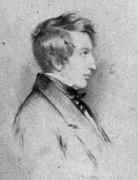Person: Gregory (8), Duncan

Duncan Gregory was a Scottish mathematician who was one of the first to investigate modern ideas of abstract algebra. He was a great-great-grandson of James Gregory
Mathematical Profile (Excerpt):
- He showed great promise at school and, during the winter of 1827, Gregory was sent to an academy in Geneva where his mathematical talents were obvious to the teachers.
- On his return from Geneva, Gregory became an undergraduate at Edinburgh University where he began to study advanced mathematical topics and he also conducted experiments with polarised light.
- In October 1833, at the age of 20, Gregory entered Trinity College, Cambridge, receiving his B.A. in 1837, being ranked fifth wrangler, and his M.A. in 1841.
- At this time the Cambridge Mathematical Journal was beginning publication and Gregory became its first editor.
- Many of the papers in the early parts of the Journal are written by Gregory himself.
- Gregory declined a chair in Toronto in 1841 due to ill health.
- His work in this area is described in the paper On the real nature of symbolic algebra which Gregory published in the Transactions of the Royal Society of Edinburgh.
- In this work Gregory built on the foundations of Peacock but went far further towards modern algebra.
- Gregory, in his turn, had a major influence on Boole and it was through his influence that Boole set out on his innovative research.
- Two other important works by Duncan Gregory are Examples of the Processes of the Differential and Integral Calculus and A Treatise on the Application of Analysis to Solid Geometry.
Born 13 April 1813, Edinburgh, Scotland. Died 23 February 1844, Edinburgh, Scotland.
View full biography at MacTutor
Tags relevant for this person:
Origin Scotland
Thank you to the contributors under CC BY-SA 4.0! 

- Github:
-

- non-Github:
- @J-J-O'Connor
- @E-F-Robertson
References
Adapted from other CC BY-SA 4.0 Sources:
- O’Connor, John J; Robertson, Edmund F: MacTutor History of Mathematics Archive
